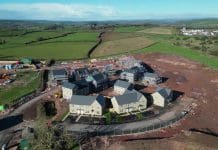The Building Safety Act received Royal Assent this month. So, what does this mean for the building control profession and what should every building control surveyor be doing now to prepare? These are the questions that LABC’s chief executive, Lorna Stimpson, has a simple answer for
“Prove you’re competent,” is Lorna’s answer. But what are, on the surface, simple answers have been much more involved for LABC – the organisation that represents around 3,500 public service building control surveyors. LABC has invested millions over the last few years preparing for the new building safety act and – crucially – the forthcoming registration of the building control profession.
The registration of the profession is one of the most significant impacts of the Building Safety Act, which is wide ranging and will ultimately affect all English and Welsh local authorities – not just those with tall residential buildings. And measures in the bill mean all those working in building control, in both the private and public sector, will soon have to register if they want to continue to practise.
The new Building Safety Regulator will oversee the building control system and be the registrar for the entire profession. Local authorities will be required to “take the advice of a Registered Building Inspector” before issuing certification or to carry out plan assessments and site inspections.
Registration is likely to have a significant impact for building control teams, with all LABC surveyors needing regular formal assessment of competence as part of the process. Terms and conditions of employment of building control surveyors are also likely to be affected.
Some in local government have already seen changes – since August 2021 applicants for planning permission have been subject to Planning Gateway 1 for new build or refurbished buildings over 18m. This Gateway establishes the Health & Safety Executive as a statutory consultee and requires a developer to submit a fire statement specific to their development when submitting a planning application.
Building control professionals will be affected the most – how can they prepare?
But, of all the local government professions, building control will see the most extensive change. In addition to the registration of the profession, building control needs to be ready for:
Multidisciplinary teams
Local Authority Building Control surveyors will form part of the regulator’s multidisciplinary team alongside HSE inspectors and fire service officers. These teams will work together to regulate new in-scope buildings and those going through refurbishment. Local Authority Building Control will also have a significant role as part of these teams in assessing and certifying the 12,500 existing high-rise buildings. Local authorities with in-scope buildings will need robust, well-resourced building control teams.
Aiding the Building Safety Regulator
The bill places an obligation on local authorities to support the regulator by providing skilled, experienced and competent staff. Local authorities will have to make sure staff involved in assisting the regulator have verified skills, knowledge and experience.
LABC has been working closely with HSE and DLUHC on building control operational standards, KPIs and professional registration. All building control teams will need to adopt these new operational standards and will face sanctions from the regulator if they fail to meet them.
To support their investment in competence validation, earlier this year LABC won its bid for DLUHC grant funding to assist with the upskilling of building control professionals who will work on high-rise “in-scope” buildings. LABC is providing gap funding for those areas currently without in-scope buildings and to extend competence validation to Wales.
Last year, LABC established the Building Safety Competence Foundation (BSCF), a not-for-profit community interest company. The foundation will deliver competency validation industry-wide. To ensure transparency and impartiality, the BSCF’s governance model includes, in addition to public service building control representatives, independent directors Lord Porter (Local Government Association), Nick Coombe (National Fire Chiefs Council), Graham Watts (Construction Industry Council) and Paul Timmins (Construction Industry Council Approved Inspectors Register).
The BSCF is working closely with UKAS towards accreditation under ISO/IEC 17024 (conformity assessment for bodies operating the certification of persons), with UKAS certification anticipated this summer. The registration of building control professionals is expected to require proof of competence via a UKAS- or Engineering Council-accredited scheme. The ISO accreditation will allow the BSCF to deliver such competency assessments.
The foundation is now offering competence validation assessments at domestic, general and specialist levels to the whole building control profession and is actively engaging with private sector building control approvers to gain their trust in delivering this important verification of professional competence.
Lorna Stimpson, LABC chief executive, adds: “The Building Safety Bill is probably the most significant piece of legislation affecting the built environment in decades – all councils and everyone in building control needs to know its effects. The new safety regime means more duties for local authorities and a requirement for registration of the building control profession.
“It’s absolutely vital that public service building control is ready for the new regime and that means everyone in our network needs to prove they’re competent. Please get in touch with us here at LABC if you need more information.”
Lorna Stimpson

Chief executive
Local Authority Building Control
Tel: +44 (0) 20 8616 8120
Twitter: @labcuk
LinkedIn: Labc

















